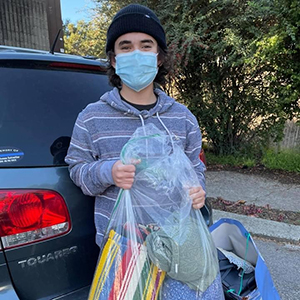Teens Stepping Up for Community
By Jeanette Prather

There are no shortages of communities needing help in a variety of ways, and it seems no shortage of organizations ready to meet those needs..
 Santa Cruz teens and tweens haven’t just been sheltering in place during the pandemic—they have been getting out to help the community.
Santa Cruz teens and tweens haven’t just been sheltering in place during the pandemic—they have been getting out to help the community.
“I like volunteering because it feels good to know that I’m helping out, and that I can make people happy, especially during this pandemic,” said 12-year-old Zoe Robinson. “Making cards for seniors was a fun and easy volunteer project to do from home.”
Robinson, referencing the Volunteer Center of Santa Cruz County’s YouthSERVE division’s recent Cards for Seniors project, is one of many youth volunteers trying to lift the spirits of local elderly citizens with positive messages. “We’re partnered with Family Service Agency of the Central Coast, who’s the one gathering our cards and distributing them out to care facilities throughout the county,” confirmed Volunteer Center of Santa Cruz County’s YouthSERVE Coordinator, Malia Yamashita. “We’ve made thousands of cards from hundreds of participants.”
Despite running into COVID-related in-person volunteer restrictions, Yamashita mentioned that YouthSERVE’s one-time volunteers have increased. “We’re mostly doing at-home projects right now but hope to get more outdoor projects going like beach clean-ups come spring and summer.”
Another institution creating heart-felt messages across multiple generations is the Unitarian Universalist Fellowship of Santa Cruz County. “With so many people living on their own during quarantine, many of us feel the disconnect from our social outlets,” said UUFSCC Religious Exploration Team Chair, Jessica Bukowinski, referencing the highly attended lunches formerly succeeding the fellowship. “After an open discussion about possible service projects, [UUFSCC’s youth fellowship] decided to focus on bridging the generations within our fellowship community.”
The youth fellowship, also known as the ‘Dolphin’ youth group and comprised of 9–12-year-olds, pitched the Intergenerational Communications Unlimited “I SEE YOU,” or I.C.U. project to the rest of the congregation, which was receptive to the idea. “We believe a long-term pen pal connection could continue to grow our social connection between our experienced elders and our wise youth during the pandemic (and perhaps well after),” wrote the Dolphin group.
Spearheaded by UUFSCC’s Religious Exploration Coordinator, Tara Nunya, the program involves a questionnaire that helps the team match pen pals based on mutual interests. “We match you with someone who we feel is a good match of both similar likes and things you could learn from each other,” explains the group’s website. “You are welcome to correspond as a family or an individual. By joining you agree to respond to your carefully matched pen pal/family minimally two times a month.”
A recent high profile youth good deed came from 16-year-old Scotts Valley High School junior, Jeremy Goodrich. “I come with my friends to Downtown Santa Cruz and I see the homeless. They’re freezing and it looks miserable,” Goodrich told KION last winter when asked why he decided to spearhead the school-wide blanket and coat drive. “People who have houses have extra blankets and jackets. It’s just a good way to help them out.”
“[Jeremy] is our Junior Class President this year, and together with ten other juniors in our Student Government class, they organized the coat and blanket drive,” said Scotts Valley High School Activities Director/Humanities Teacher, Dayna Fisher, and the faculty member who oversaw the junior class’s efforts. “They would guesstimate that they collected about 40 large bags full of blankets and jackets.”
Fisher mentioned that the blanket and coat drop-off location was the Four Points by Sheraton on Scotts Valley Drive, and then the items were delivered directly to the two agencies that the junior class chose, Food not Bombs and the Warming Center Program Footbridge Service Center. “They were able to set out the items they brought in and were so pleased to see the donated items go directly to those in need,” said Fisher.
Another academic organization offering a robust list of volunteer opportunities, is Pacific Collegiate School. “A lot of our students have corresponded with shut-ins and created letters for assisted living. They’ve also helped people who had to evacuate due to the fires,” said Liz Musal, PCS’s community service program coordinator. “We’ve also done a letter advocacy program to government officials. Students can even design their own service opportunity if they want to.”
Musal mentioned that while coordinating volunteer and community service efforts has been met with some challenges since the pandemic and subsequent in-person restrictions, PCS students have gotten creative in accommodating their good deeds. “We had one student who made over 370 masks that were donated through the Parks and Rec department as well as the Volunteer Center,” said Musal. “We’ve had a lot of kids doing things remotely. We’re really trying to encourage safe, social-distanced community service opportunities, and have even relaxed our community service expectations because we just want kids helping in the community however possible. We also want their families to help other families. It’s a good lesson for all of us during this challenging time; we all need to help each other out. A lot of kids have really stepped up.”
While not all organizations have side-stepped their regular volunteer activities, most of them have and can. One seemingly difficult integration would be how to handle food donations during this time. Although the Teen Kitchen Project can’t offer their regular in-person volunteer activities, they’ve opened up a slew of other ways to get involved. “We have other opportunities to help serve the community through our new Community Cares Program,” wrote TeenKitchenProject.org. “In this program, youth commit to serving our clients in ways that help them feel supported and loved, [which] includes calling clients to check in, making cards at home for our clients using our creative card kits, [and] assembling flower arrangements.”
The opportunities for teens and tweens to help their communities don’t stop there! The 2018-created, Santa Cruz-founded Lyftly app offers peer-to-peer support in regard to mental health. “[Teens] can share their feelings in a protective community, seeking help through creating private and/or peer communities,” said the now Los Gatos-located app founders, CEO Ram Ramanujam PhD/MBA and COO Dev Joshi. “We also have Lyftly certified peers who have gone through their own journeys and have backgrounds in psychology. There are teen volunteers between the ages 15 and 18 who don’t have backgrounds in psychology and who simply volunteer to help their peers. The app also has a lot of pandemic help and resources for teens.”
This was merely a handful of local agencies who are hosting selfless younger generations making a difference and paving the way for what a new model of helping out might look like post-COVID. Cheers to the youth out there making a difference and helping other Santa Cruzans.







